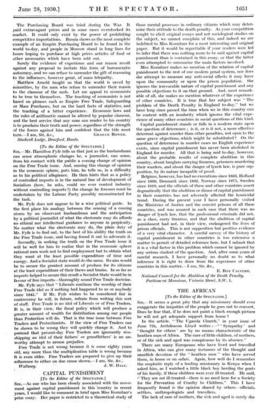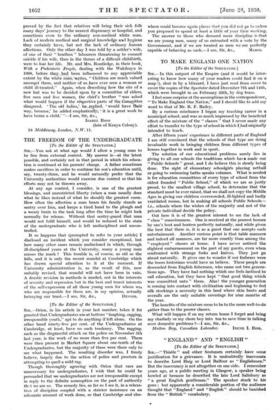THE AFRICAN
[To the Editor of the SPECTATOR.] SIR,—It seems a great pity that any missionary should ever exaggerate the iniquities of the people he goes out to convert. Does he fear that, if he does not paint a black enough picture he will not get adequate support from home ?
In the article, "The Uganda Church," in your issue of June 7th, Archdeacon Lloyd writes Sympathy' and 'thought for others' are by no means characteristic of the heathen man of Africa. The care of little children, of mothers, or of the sick and aged was conspicuous by its absence."
There are many Europeans who have lived and travelled in Africa, who can give many instances of the thought and unselfish devotion of the "heathen men" who have served them, in home or on safari. Again, how well do I remember the emphatic reply of a leading missionary in Kenya when I asked him, as I watched a little black boy herding the goats of his family, if these children were ever ill-treated. He said, "They are not ill-treated—there is no need here for a Society for the Prevention of Cruelty to Children." This I have frequently found is the opinion shared by others—officials, settlers, anthropologists and travellers.
The lack of care of mothers, the sick and aged is surely dia.,
proved by the fact that relatives will bring their sick folk many days' journey to the nearest dispensary or hospital, and sometimes even to the ordinary non-medical white man. Lack of modern medical and surgical knowledge and hygiene they certainly have, but not the lack of ordinary human affections. Only the other day I was told by a settler's wife, of one of their " heathen " labourers threatening to commit suicide if his wife, then in the throes of a difficult childbirth, were to lose her life. Mr. and Mrs. Routledge, in their book, With a Prehistoric People, dealing with the Wakikuyu in 1908, before they had been influenced to any appreciable extent by the white miii,-Ngites, "Children are much valued. amongst them, and neither of us have ever seen a woman or child ill-treated." Again, when ascribing how the site of a new hut was to be decided upon by a committee of elders, five men and five woolen, the chief's brother "was asked what would happen if the respective parts of the Camttee disagreed. 'The old ladies,' he.eplied, 'would have their
way, because,' he added emphaticall it is a great work to have borne a child.' "—I am, Sir, &c., IsABEL Ross (late of Kenya Colony).
24 Middlezvay, London, N.W. 11.



















































 Previous page
Previous page